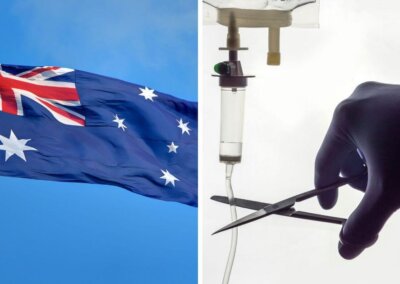A baby who was born the size of a cookie at 25 weeks gestation spent 115 days in hospital and was able to spend his first Christmas at home.
Baby Wells was born at just 25 weeks gestation in November 2021 with his twin, Ezra. Sadly, because the pair were born so prematurely, Ezra died shortly after birth. While Wells was not in as critical a condition as his brother, he had to spend the next 115 days in intensive care.
Born in Indiana, Wells was classified as a micro-premmie because he was born before 26 weeks gestation and weighed just 1lb 8oz.
His mum, Paige Hurd, details the traumatic events surrounding his birth.
She said “As I was pregnant with twins, I had more scans than usual – all of which were normal. But, I just knew something was going to go wrong. I went to two different doctors and they said everything is OK but my maternal instincts disagreed”.
Mum and Dad prepared for the worst
“On the day I gave birth, I remember feeling fine as I rocked my daughter Hazel, then 11 months, to sleep”.
“But then I felt a random pain but it wasn’t very severe, I put Hazel into her crib as the pain worsened”.
“I quickly realized it was contractions, and in between calling my husband and calling 911, I gave birth to Ezra, just 15 minutes after I first noticed the pain”.
Paige said that she and her husband Zachary “prepared for the worst” after their son Ezra died, afraid that they might lose Wells as well.
The doctors informed Paige that Wells was likely to have a bleed in his brain and could have cerebral palsy. It is common for extremely premature babies to be born with medical difficulties, some of which must be treated immediately, and others that can have lasting effects.
Things were touch and go in the beginning, especially when his lungs collapsed less than a week after his birth. Things became harder for Paige who could not see her son due to hospital covid regulations.
“A joy to be around”
Though she was grateful for the effort the nurses made over Christmas 2021, Paige revealed she felt “helpless” because the nurses were in charge of feeding and changing him.
“I didn’t feel like a mom until he came home on February 28, 2022”, she added.
Despite the ups and downs, Wells got stronger and stronger. “He uses every muscle in his body to do what he wants, he is reaching milestones quicker than Hazel [his sister] did”, Paige said.
By August 2022, Wells was able to stand and his mum said he was “a wild little boy” who was “a joy to be around”. And since the family missed out on Christmas 2021, they made sure Christmas 2022 was extra special. The family put up their Christmas tree in November and read Christmas stories to their children every night.
Almost four out of five babies born prematurely between 22 and 28 weeks gestation survive to discharge from the hospital according to recent research.
A study, ‘Mortality, In-Hospital Morbidity, Care Practices, and 2-Year Outcomes for Extremely Preterm Infants in the US, 2013-2018’, by Dr Edward F Bell of the University of Iowa, found that from 2013 to 2018, with infants born between 22 and 28 weeks gestation, “survival to discharge occurred in 78.3% and was significantly improved compared with a historical rate of 76.0% among infants born in 2008-2012”.
The study, which took place between 2013 and 2018, assessed 10,877 infants born between 22 and 28 weeks gestation in 19 academic medical centres across the US.
This means that almost four out of five extremely prematurely born babies survived and were able to be assessed at 22-26 months corrected age (22-26 months from their due date) for a number of health and functional outcomes.
Right To Life UK spokesperson Catherine Robinson said “The outcomes for extremely premature babies are improving all the time and it is wonderful to hear that baby Wells has been able to spend Christmas with his family”.












